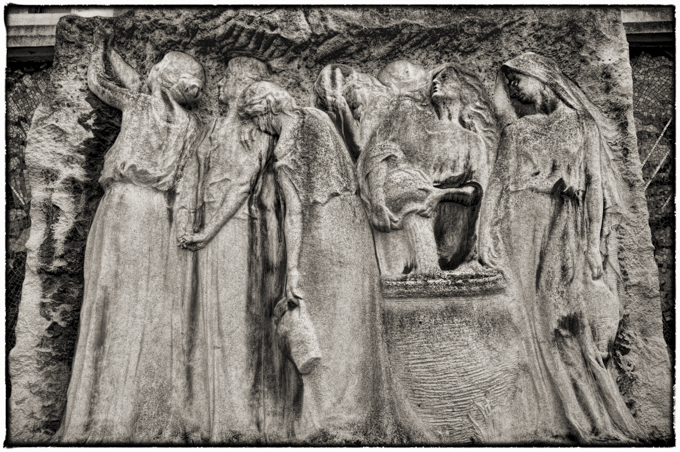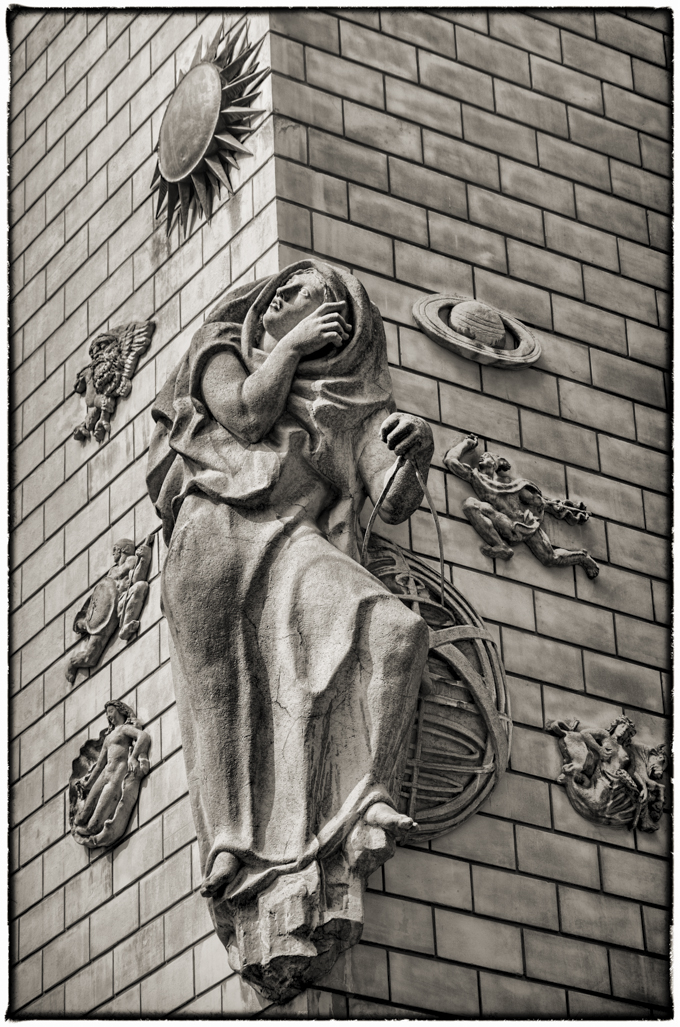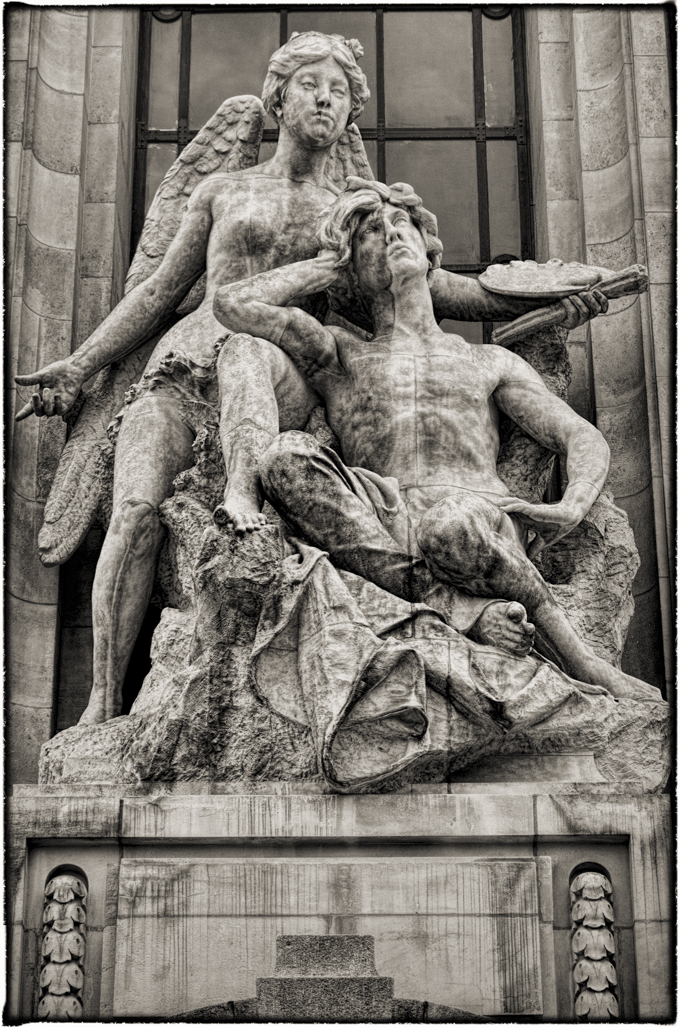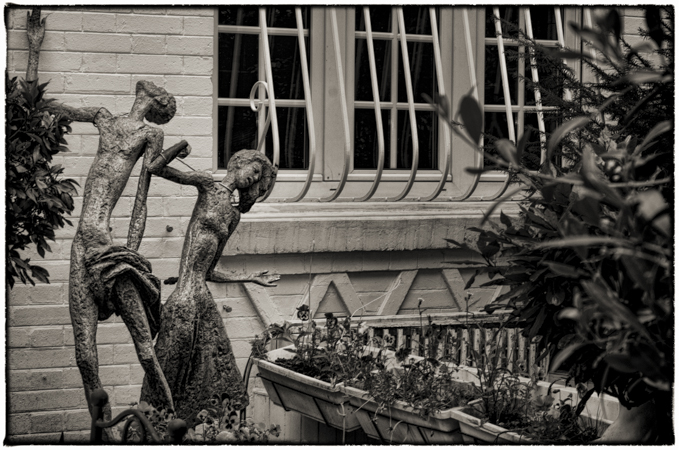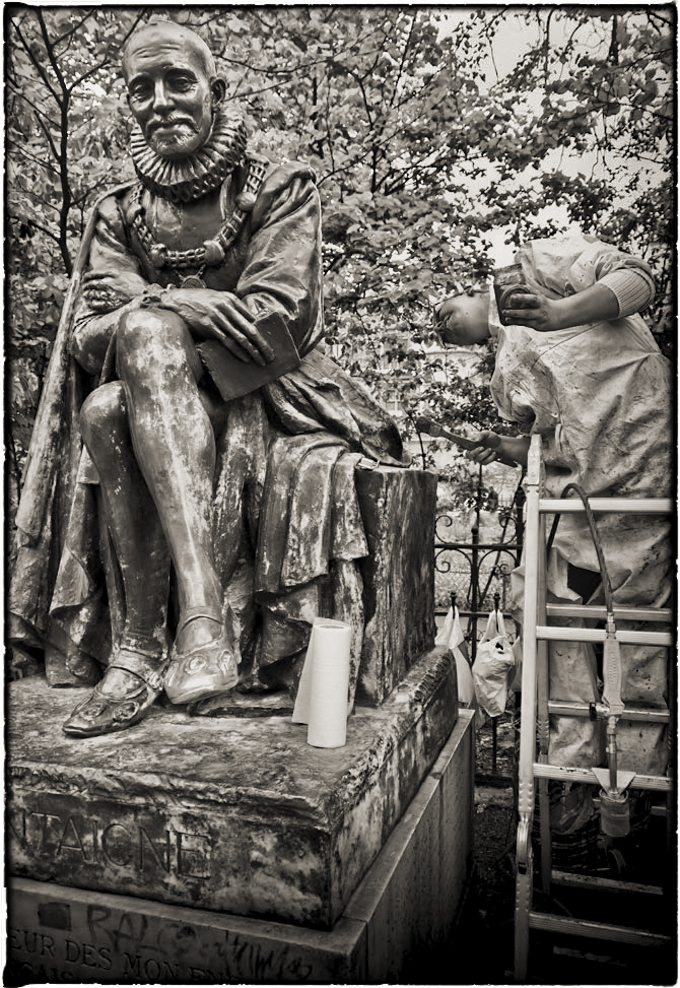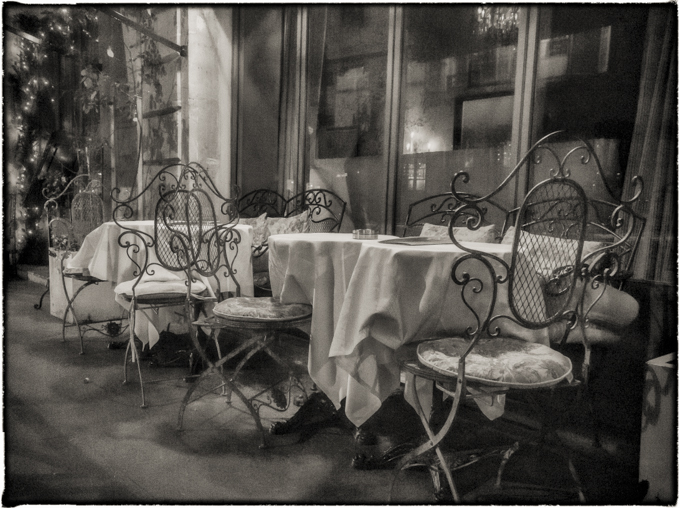
The artist's life has its ups and downs.
In what now seems like a past life, I worked out of Santa Fe as a traveling art dealer, having canvases by various artists delivered to me by moving van in various cities across the American West, and setting up temporary galleries to show their work, including in a suite at Los Angeles' Chateau Marmont.
Some of my artists called me often, anxious to see if anything sold. Some trusted to fate, and waited for me to call them. I was sad when I had no good news, elated when I could report that I would bring them back enough money to constitute their first mortgage.
Now, in this community of Paris street artists, Richard and I watch these same fluctuations of fortune, but without the same financial stake.

Last June, we were able to accompany the shy, prolific, gentle knight of Paris street art, Fred Le Chevalier, one of our favorite artists and people, as he pasted up a whimsical street mural to say thank you to Paris Play for allowing our photographs to be used in his first book, when Quel dommage! the police caught up with Fred and threatened him with a fine and jail time for putting his craft on the streets. Our story, which caught the attention of Huffington Post writer Mary Duncan, leaves Fred in limbo, the Damoclean sword of justice poised over his elfin head.
Would he exile himself into the suburbs, or return, rolled posters and paste pots in hand, to the Paris streets?
Can you guess?

Three weeks after his confrontation with the police, we began to see new Freds appearing in the 11th arrondissement, and then spreading outward from there. Since then, we've been able to follow and photograph him a few times alone, and in the company of his fellow street artist, Madame, as he continues pasting his work up and helping friends do the same.

His attitude? If convicted he's willing to do the time, or pay the fine, because the art is paramount. Besides, his work is paper pasteups, which are easily taken back down, and which decay anyway when exposed to time and weather. If he spray-painted, he says, he could understand the attitude of the police and building owners. It's harder to remove, and often it's just adolescent scrawls.
(It's worth noting that the rise of hip-hop culture, which caused a flood of graffiti to wash over every city in the world, helped to criminalize street art here. Where the attitude in Paris was more laissez faire toward poster and stencil artists (who were an important political voice) in the 1980s, the amount of inferior quality, hard-to-remove graffiti and tags caused authorities by the end of the decade to overreact and condemn all street art as vandalism. Seminal French artists like Blek le Rat (inspiration for the British artist Banksy) and Miss-Tic were driven from the Paris streets with onerous fines and jail threats. Thus a Fred Le Chevalier is now equal in the eyes of the law to a 14-year-old with a spray can hidden up his or her sleeve.)
So, we are pleased to report that Fred is back, and his work has grown even larger. Billboard-sized.

Yesterday, Fred was honored by the street artist association, Le M.U.R., by being asked (and paid a 500-euro honorarium by the same city hall that criminalizes art work elsewhere) to create a billboard-sized mural on the billboard they manage legally at rue St. Maur and rue Oberkampf, a scant five blocks from Fred's apartment.
The Le M.U.R. billboard has been going since 2007, and features, every two weeks, the work of an urban artist from somewhere in the world, from Sao Paolo, to New York City, to Barcelona, to name only a few cities. The billboard aims to promote all kinds of street art, and each work's limited shelf life is an homage to the fact that street art is ephemeral by nature. We covered Le M.U.R.s last artist's gathering in November 2011.

But Fred being Fred, the prime exponent of the French troubadour tradition, his Le M.U.R. appearance was not just a chance to decorate a billboard, but for an event, a happening. He designed and created two hundred and fifty masks, each cut out and drawn and colored by hand, and turned the audience into participants at a masked ball celebrating the dance of love. The space was jam-packed. Everywhere you turned there were photographers capturing the play, and the conversations were warm and frolicsome, too.


I was immediately transported into yet another "past life," Berkeley in the late '60s, where I lived in a commune of artists and we created performance art, in which as many as 100 people would create an Event for one person, the aim of which was to transform that person's life, in some small way. Example: a San Francisco poet whose work was lyrical, imaginative and surreal, but who read his work with all the vividness of a banker counting money, and (unbeknownst to him), needed our help in loosening up his performances.
Michael Haimovitz, the ringleader of these Events, invited a group of men and women to a big, elegant house high up in the Berkeley Hills with views of the San Francisco Bay and the Golden Gate Bridge. As the poet began to read his poems, the room became warm, overheated, and all the men left, seemingly to try to fix the problem. None of them returned. The poet looked crushed, and kept his eyes locked on the page. As he droned on, some twenty-five women in the room (who were all beautifully, even a bit primly dressed), one by one, shed their silky dresses and lingerie. The next time the poet glanced up from the page, every woman in the room, all of us in our early 20s, was naked. The lights dimmed, and each of us began to chant one phrase from one of his poems.
Several women cleared his manuscript and glass of water from the long pine table at which he was reading, covered it with a thick cloth, and removed the poet's clothes.

Several other women guided him to lie down on the table and began to expertly massage him, while the chorus of women continued to chant phrases from his poems, and to tattoo him all over with stamps on which the images of his poems were inked.
The whole time he laughed so hard we thought he might melt.
And then he was dressed, and the lights turned off and the women returned to their seats. When the lights were lit again, every woman was fully dressed, legs crossed, listening as attentively as if we were at the Berkeley Library.
And what a performance he gave after that! And ever after, too, including at Radcliffe College to a standing ovation. When he returned to his apartment that night in San Francisco, it was long after midnight. But he had to call someone, had to tell a friend about the Event. He knocked on the door of his neighbors, two women who were in love with each other, and told them the tale of all these naked women. His two friends insisted on helping him wash off the tattoos, and got into the shower with him, as he told them every last detail. (Many of these performance pieces are dramatized more fully in the novel I just completed, "The Book of Twelve.") These Events we did were not for money, not for power, only for love, of one other human being at a time.
Fred's Events, Fred's spirit, remind me of that time in Berkeley in the '60s. He is not motivated by ambition or power or fame, rather by the spirit of love.

So thank you Fred, for persevering in your art in the face of government madness, and for putting love at the center of life, where it belongs. You are truly Aphrodite's chevalier.
As for getting Fred his first mortgage? Buy his work and that dream, too, will happen.

(For a supplement to this post--more pictures from Fred's day at Le M.U.R--see and like Paris Play's Facebook page.)
 03.9.2014
03.9.2014 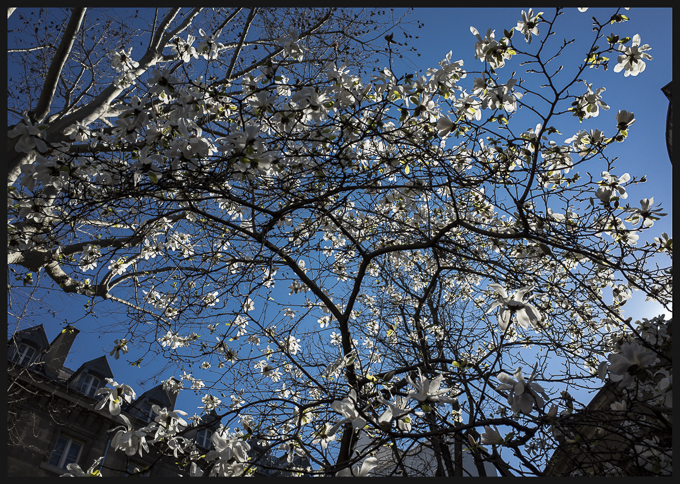
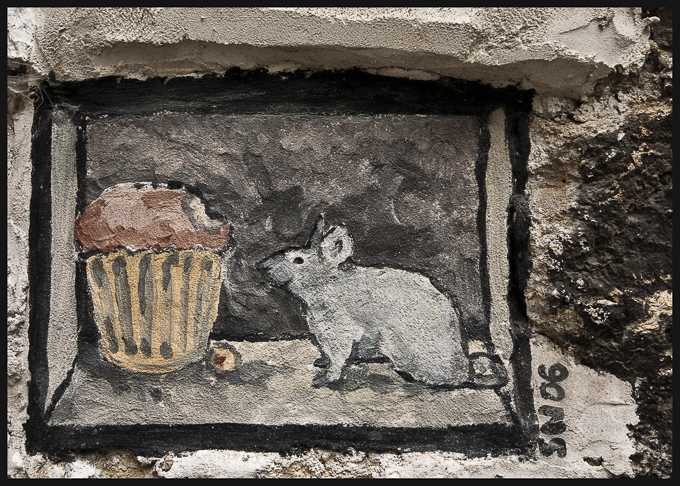
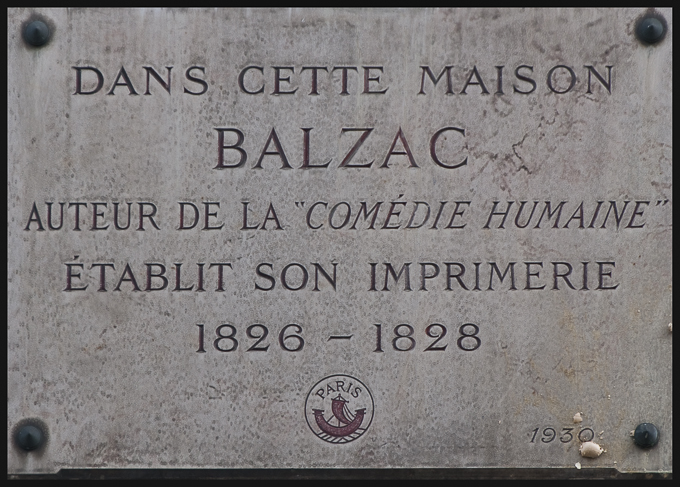

 Balzac,
Balzac,  cafes,
cafes,  spring in
spring in  Paris Life
Paris Life 


















 Street Art © 2014 Fred Le Chevalier
Street Art © 2014 Fred Le Chevalier Street art © 2014 Fred Le Chevalier
Street art © 2014 Fred Le Chevalier 
